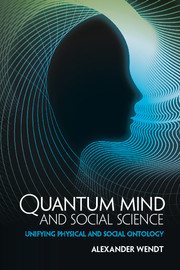Book contents
- Frontmatter
- Dedication
- Epigraph
- Contents
- Acknowledgments
- 1 Preface to a quantum social science
- Part I Quantum theory and its interpretation
- 2 Three experiments
- 3 Six challenges
- 4 Five interpretations
- Part II Quantum consciousness and life
- Part III A quantum model of man
- Part IV Language, light, and other minds
- Part V The agent-structure problem redux
- Conclusion
- Bibliography
- Index
4 - Five interpretations
from Part I - Quantum theory and its interpretation
Published online by Cambridge University Press: 05 May 2015
- Frontmatter
- Dedication
- Epigraph
- Contents
- Acknowledgments
- 1 Preface to a quantum social science
- Part I Quantum theory and its interpretation
- 2 Three experiments
- 3 Six challenges
- 4 Five interpretations
- Part II Quantum consciousness and life
- Part III A quantum model of man
- Part IV Language, light, and other minds
- Part V The agent-structure problem redux
- Conclusion
- Bibliography
- Index
Summary
While there is general agreement that quantum theory poses a fundamental challenge to the classical worldview, there is none on what worldview should replace it. This lack of clear positive implications is the heart of the interpretation problem in quantum theory, or understanding what the world must be like assuming the theory is true. The difficulty is twofold. First, if the theory is correct and complete then there seems to be no way to adjudicate empirically among its interpretations, forcing us to rely on metaphysics instead. Second, the classical metaphysics upon which human beings have relied in the past to interpret new theories is now itself problematic, leaving us without an interpretive backstop to anchor our thinking. Bell is surely right in expecting whatever picture of reality eventually emerges from quantum theory to “astonish us,” but by the same token it is very hard to see what that picture should be.
In this chapter I address the debate about the positive worldview implications of quantum theory. Of all the chapters in this book it is the farthest removed from the concerns of social scientists. However, it plays an important dialectical function in my argument, which is to introduce and help justify the panpsychist interpretation of quantum theory that I will embrace and discuss at more length in Chapter 6. By ‘justify’ I do not mean that I will defend this interpretation as superior to others. My purpose is more modest, which is simply to show why, despite what might seem to be its bizarre and counter-intuitive nature, panpsychism is taken quite seriously by philosophers of physics as a way to interpret quantum theory. That's because (a) there are strong analogies between quantum systems and the human mind, and (b) the alternatives are equally bizarre and counter-intuitive. If readers are prepared to accept that panpsychism is a valid approach to the mind–body problem, then this chapter may be skipped – which I have made less costly by deferring until Chapter 6 a discussion of time-symmetric approaches like the Transactional Interpretation, which will play an important role later in the book.
- Type
- Chapter
- Information
- Quantum Mind and Social ScienceUnifying Physical and Social Ontology, pp. 70 - 90Publisher: Cambridge University PressPrint publication year: 2015



